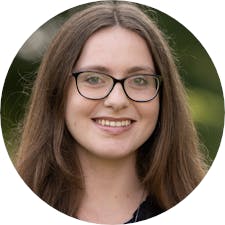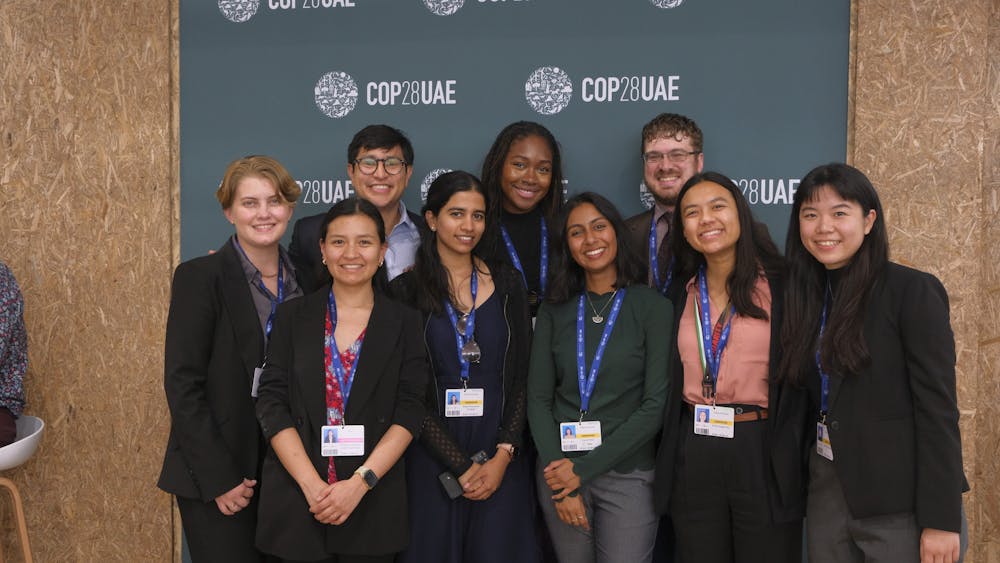A delegation of Duke students attended the 2023 United Nations Climate Change Conference in Dubai, United Arab Emirates, in early December to observe negotiations and learn about climate policy for a Bass Connections course.
This started as an initiative by students, said Gabriela Nagle Alverio, a second-year law student and doctoral student at the Nicholas School of the Environment who served as a teaching assistant for the course last fall.
“Students wanted to find a way to get to COP, and so they started meeting amongst themselves and teaching each other about the [United Nations Framework Convention on Climate Change] and then gathering funding in order to be able to go,” she said.
In the 10 years since then, the Bass Connections program sponsored student efforts and developed an official course, U.N. Climate Change Negotiations Practicum.
The course content changes yearly and is determined by the two TAs who decide which topics are most relevant for the upcoming conference. The lessons also feature weekly guest speakers from a variety of political, business and environmental backgrounds.
At the end of the semester, the class participates in a mock negotiation process where students act as representatives for a certain country and promote that country’s position on a hot-button climate issue in preparation for the conference.
“The most important piece of that experience has to be to really get an on-the-ground sense of how climate diplomacy works in practice at the negotiation level, but just as importantly outside the negotiations with the increasing volume of activity that happens at these conferences … there’s really no way to properly understand that than to attend,” said Jackson Ewing, director of energy and climate policy at the Nicholas Institute for Energy, Environment & Sustainability, which helps organize the practicum.
The delegation included 16 students from across the University’s undergraduate and graduate programs, led by Ewing and the two TAs Nagle Alverio and Ina Liao, a master’s student at the Nicholas School.
The participants from Duke joined around 84,000 other attendees of this year’s COP, the largest iteration of the conference by far.
Much of the students’ participation took place in “side events” organized by the UNFCCC, where Nagle Alverio said that they networked with global leaders in the fields of climate science, policy and business in addition to learning about groundbreaking research and pressing environmental, political and economic concerns.
Brook Hemphill, a master’s student at the Nicholas School, attended events during her week at COP28 such as "country pavilions," where individual nations were given the opportunity to present new research or raise awareness about pressing concerns, and to learn about sustainable developments in forestry.
“I’ve always been interested in what’s going on with forests in the world and passionate about specifically addressing the drivers of deforestation, but also making sure that the livelihoods of people and the actors and stakeholders in forest-based initiatives are all receiving the finances and in a high-integrity way,” Hemphill said.
Although she is not enrolled in the Bass Connections course, sophomore Vanessa Santini Gomes attended the COP after receiving a party overflow badge from the government of Brazil, giving her access to the negotiations themselves.
“There’s not much representation of communities [such] as the one I come from in Brazil in spaces like COP, so I decided to try and use my space of privilege at Duke to represent my community and bring some voice to the people that helped me to grow up,” Santini Gomes said.
Both students said their experience at COP28 was personally and professionally transformational.
“I think being at my first COP ever was a pivotal moment in my career … being able to see all the different types of people that are working [to reduce] our emissions globally was a huge moment,” Hemphill said.
Santini Gomes felt the biggest impact in terms of gaining activism experience and forging meaningful connections with other attendees with similar passions.
This year’s COP has been largely hailed as one of the most historic to date, as an agreement was reached in the conference’s final hours on Dec. 13 to “transition away from fossil fuels,” despite serious pushback from fossil fuel industry representatives who showed up in unprecedented force.
“The fact that fossil fuels were mentioned explicitly is quite important because in 30 years this has never, surprisingly, taken place,” Ewing said.
Ewing noted some important caveats about the efficacy of the phase-down agreement. First, there are no binding commitments to this transition. Additionally, vague language in the agreement leaves room for interpretation that fossil fuel companies could take advantage of to continue development.
Nevertheless, he stated that the “transition away” language is an important symbol of progress that gives climate advocacy groups a stronger footing when holding government officials and fossil fuel industry actors accountable to the commitments made at COPs.
The countries also agreed to triple global renewable energy infrastructure by 2030, as recommended by the International Energy Agency and International Renewable Energy Agency to limit warming to 1.5℃ above pre-industrial levels.
“[The commitment] does offer kind of a signpost and a goal to pursue that is ambitious but also not so ambitious as to be unrealistic,” Ewing said.
Editor's Note: This article was updated Thursday night to include that the Nicholas Institute for Energy, Environment & Sustainability helps organize the practicum.
Get The Chronicle straight to your inbox
Signup for our weekly newsletter. Cancel at any time.

Zoe Kolenovsky is a Trinity sophomore and news editor of The Chronicle's 120th volume.

